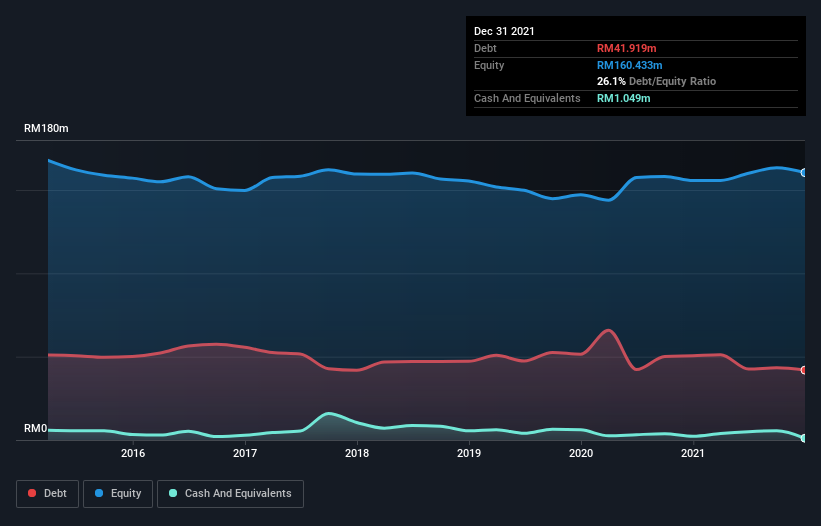- Malaysia
- /
- Industrials
- /
- KLSE:TANCO
Would Tanco Holdings Berhad (KLSE:TANCO) Be Better Off With Less Debt?
Legendary fund manager Li Lu (who Charlie Munger backed) once said, 'The biggest investment risk is not the volatility of prices, but whether you will suffer a permanent loss of capital.' So it seems the smart money knows that debt - which is usually involved in bankruptcies - is a very important factor, when you assess how risky a company is. Importantly, Tanco Holdings Berhad (KLSE:TANCO) does carry debt. But should shareholders be worried about its use of debt?
Why Does Debt Bring Risk?
Debt and other liabilities become risky for a business when it cannot easily fulfill those obligations, either with free cash flow or by raising capital at an attractive price. In the worst case scenario, a company can go bankrupt if it cannot pay its creditors. However, a more common (but still painful) scenario is that it has to raise new equity capital at a low price, thus permanently diluting shareholders. Of course, debt can be an important tool in businesses, particularly capital heavy businesses. When we think about a company's use of debt, we first look at cash and debt together.
View our latest analysis for Tanco Holdings Berhad
How Much Debt Does Tanco Holdings Berhad Carry?
As you can see below, Tanco Holdings Berhad had RM41.9m of debt at December 2021, down from RM50.6m a year prior. However, it does have RM1.05m in cash offsetting this, leading to net debt of about RM40.9m.

How Healthy Is Tanco Holdings Berhad's Balance Sheet?
Zooming in on the latest balance sheet data, we can see that Tanco Holdings Berhad had liabilities of RM79.2m due within 12 months and liabilities of RM32.2m due beyond that. Offsetting these obligations, it had cash of RM1.05m as well as receivables valued at RM2.98m due within 12 months. So its liabilities total RM107.4m more than the combination of its cash and short-term receivables.
This deficit isn't so bad because Tanco Holdings Berhad is worth RM356.6m, and thus could probably raise enough capital to shore up its balance sheet, if the need arose. But we definitely want to keep our eyes open to indications that its debt is bringing too much risk. The balance sheet is clearly the area to focus on when you are analysing debt. But it is Tanco Holdings Berhad's earnings that will influence how the balance sheet holds up in the future. So when considering debt, it's definitely worth looking at the earnings trend. Click here for an interactive snapshot.
In the last year Tanco Holdings Berhad wasn't profitable at an EBIT level, but managed to grow its revenue by 88%, to RM4.8m. With any luck the company will be able to grow its way to profitability.
Caveat Emptor
Even though Tanco Holdings Berhad managed to grow its top line quite deftly, the cold hard truth is that it is losing money on the EBIT line. To be specific the EBIT loss came in at RM12m. Considering that alongside the liabilities mentioned above does not give us much confidence that company should be using so much debt. So we think its balance sheet is a little strained, though not beyond repair. Another cause for caution is that is bled RM13m in negative free cash flow over the last twelve months. So to be blunt we think it is risky. The balance sheet is clearly the area to focus on when you are analysing debt. However, not all investment risk resides within the balance sheet - far from it. These risks can be hard to spot. Every company has them, and we've spotted 5 warning signs for Tanco Holdings Berhad (of which 2 are a bit concerning!) you should know about.
Of course, if you're the type of investor who prefers buying stocks without the burden of debt, then don't hesitate to discover our exclusive list of net cash growth stocks, today.
Valuation is complex, but we're here to simplify it.
Discover if Tanco Holdings Berhad might be undervalued or overvalued with our detailed analysis, featuring fair value estimates, potential risks, dividends, insider trades, and its financial condition.
Access Free AnalysisHave feedback on this article? Concerned about the content? Get in touch with us directly. Alternatively, email editorial-team (at) simplywallst.com.
This article by Simply Wall St is general in nature. We provide commentary based on historical data and analyst forecasts only using an unbiased methodology and our articles are not intended to be financial advice. It does not constitute a recommendation to buy or sell any stock, and does not take account of your objectives, or your financial situation. We aim to bring you long-term focused analysis driven by fundamental data. Note that our analysis may not factor in the latest price-sensitive company announcements or qualitative material. Simply Wall St has no position in any stocks mentioned.
About KLSE:TANCO
Tanco Holdings Berhad
An investment holding company, engages in the property development business primarily in Malaysia.
Excellent balance sheet with questionable track record.
Market Insights
Community Narratives



